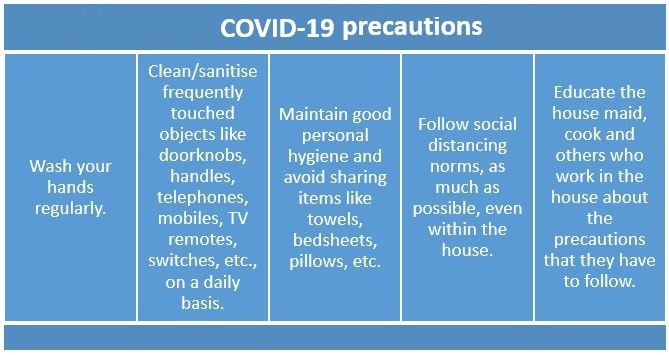Washing vegetables with soap and water? Using hydrogen peroxide for disinfecting surfaces? While you may be protecting yourself from the Coronavirus, you may end up exposing yourself to toxic chemicals that could lead to a gastrointestinal infection. Read our medical expert’s advice, to prevent yourself from falling in the trap of unscientific ways and methods
While every household tries out ways to keep the COVID-19 disease at bay, what about those surfaces that you invariably touch on a daily basis? Experts have warned that respiratory droplets on such surfaces, could be a major source for the spread of the Coronavirus. Housing.com News reached out to Dr Gaurav Singh, senior medical officer, Central Coalfields Ltd and ex-resident, AIIMS Bhubaneswar for some tips.
“It is important to understand that sanitising raw vegetables, milk packets and daily-touch objects was always important and not just because of the Coronavirus. Some people have started using detergent and water to clean raw vegetables. The problem with such techniques, is that it is nearly impossible to prevent contamination due to soap or detergent. Therefore, one may end up with a gastrointestinal infection, as a result of using unscientific ways,” says Singh. To prevent COVID-19 one merely has to follow some simple hygiene practices and follow it, irrespective of whether there is a pandemic or not.
Viruses are assemblies of say, proteins, nucleic acids, lipids and carbohydrates and need living cells to thrive. Therefore, outside your body, the Coronavirus is as good as ‘dead’. It cannot do anything to surfaces but you can be affected, if you touch the contaminated surface and therefore, this is what you need to be careful of.
We have compiled Dr Singh’s advice as follows:
How to clean vegetables/raw food?
Viruses do not grow on food but raw vegetables can be a good vehicle for it. Did you know that Hepatitis A was linked to diced tomatoes, lettuce and raspberries? An infected person can contaminate the food and pass on the virus. Seafood, if it comes in contact with faeces of an infected person can also harm you. Viruses have a higher resistance to chemical treatments than bacteria or fungi. So how should you prevent contamination?
- Wash raw vegetables in hot water or hot water with salt.
- You could also try washing the vegetables multiple times with potable water.
- Hydrogen peroxide/potassium permanganate is used by many households but it is far more effective on bacteria than on viruses.
- If you are using soap and water to clean the raw vegetables, make sure that the remnants of the soap on the surface is also cleaned well. It is difficult to wash off such stains and soap particles. Soap stains are often visible on plates, even after you wash them. The same stands true for vegetables. In fact, it is more difficult to remove soap from the surface of vegetables.
- It is best to avoid eating raw food/salads now. Cooked food minimises the risk of infection. Make sure food is properly cooked. If you use raw vegetables in salads, clean these with extra care.
- You may want to wear gloves, when you are handling/buying vegetables and fruits. Make sure you wash these gloves once you are home.
- Do not place vegetables brought from outside, straight on the kitchen counter.
- If there are vegetables that cannot be washed as soon as you bring it in, try to keep it in a closed space and do not cook or consume within three to four hours.
- Most households use domestic help and cooks, who help us on a day-to-day basis. To be fully satisfied about cleanliness, do the cleaning yourself or train your domestic help to do so.
How to sanitise milk packets?
Hot water and soap is the best way to clean these packets. Avoid placing unwashed packets in the refrigerator or pouring the milk into a vessel, without washing the packet first.

How to sanitise your phone?
Now, phones are something that everyone possesses. There are chances that you may have placed it on a shop counter or on a vegetable seller’s cart. You may have even handed it over to an outsider for some reason or attended a long call in a public space. Hence, you may feel that it is necessary to sanitise your phone. For this, use a non-abrasive disinfectant. With the help of a soft, lint-free cloth wipe clean the surface of the phone when it is unplugged. Do not use abrasive cleaners that will harm the screen. Your phone’s company too may have released guidelines about what kind of disinfectant can be applied on your phone. If you are confused, simply use a moderately wet wipe to clean the surface. Do not hand over your phone to other members in your family, especially toddlers, once you are back from somewhere. Make sure others handle your mobile phone only after you have disinfected it.
How to sanitise your mask?
Masks may become a part of your wardrobe for now, as medical experts insist on everyone using it while going outside the house. Most masks may not be made of a material that will last, if you keep washing or santising it. If you are giving a mask to a child under two years of age, make sure they do not feel suffocated. Follow the tips as listed below:
Wash your hands every time you touch your mask or remove it.
- Do not let others touch or use your mask.
- If you are opting for a homemade mask, avoid old fabric with wear and tear. Opt for thick fabric.
- Remember that a homemade mask should not just protect you but also be effective enough to protect others if you happen to cough or sneeze.
- If you are using an N-95 or surgical masks, rather than washing it, experts advice that it should be air-dried for seven days.
- Do not use alcohol, bleach or even harsh soap or detergent. These may spoil the mask and its effectiveness.
According to The World Health Organization (WHO), “The likelihood of an infected person contaminating commercial goods is low and the risk of catching the virus that causes COVID-19 from a package that has been moved, travelled and exposed to different conditions and temperature is also low.” Newspapers are sterile, given the way they are processed and printed. This is why you will find most roadside vendors giving out street food people in newspapers. However, this does not mean that it is entirely safe. If you are worried, it is alright to go ahead and cancel the subscription temporarily and opt for a digital version of the newspaper. Newspapers travel a long way, from the printing press to the distribution centre and hence, it is easier to put paper reading at bay for some time.
How to sanitise currency notes?
Post demonetisation, most businesses, big or small, have moved to e-payments. While this transition has been easy for many, for others it has posed problems. Currency notes are heavily handled and can be contaminated.
- Use digital payment platforms, as much as possible.
- If you have to use currency, make sure you wash your hands immediately afterwards.
- If you are in the marketplace, use a sanitiser immediately.
- If you do not have a sanitiser, avoid touching your mouth or nose.
How to take deliveries from an agent?
This is a time to be careful while handling couriers, parcels and deliveries. Most providers have assured us of delivery with ‘zero touch’ and are doing their bit to avoid COVID-19.
- Receive the packet in a separate tray, or use gloves.
- Maintain a distance of at least 6 ft when you meet another person who has come from outside (not just a delivery person).
- If possible, wash the packet under running water, or hot water.
- If it is a big box, you may also try to keep a dustbin outside your home, in the balcony or porch area and dispose of the packages and cartons immediately.
- As much as possible, ask the delivery person to leave the package at the doorstep.
- Wipe the doorknob clean, if it has been touched.
How to handle packed food?
Many of you may now be ordering in food or using ready-to-eat meal packages. Take for example, bread packets. How should you handle such items so as to prevent COVID-19?
- In some cases, washing the surface may not be easy. Try emptying the contents in an appropriate container or storage box. Bread can be put in a bread box.
- Pulses and other such items, can also be transferred to containers, after the packet has been wiped clean with soap and water.
- Wash your hands before touching the contents in a packet, while transferring it to a container.
- Dispose all packets in the dustbin and ensure that the dustbin is nowhere in reach of children.
Whether you should change your clothes after you return home from somewhere, is a thought that might have crossed your mind several times now. So far, there have been no documented cases of the Coronavirus disease spreading through clothes or shoes. However, it is a matter of personal hygiene that you must change your clothes and keep your shoes away if you have come back home after running errands. This is primarily required, because you will not know whom you may have come in contact with when you were outdoors – it could be a health worker exposed to a high-risk set-up or even an asymptomatic carrier of Coronavirus.
If you have maintained social distancing, you need not be worried and do not require to wash your clothes immediately after you get home. However, if you are unsure, changing clothes is a good idea.
How to sanitise medicine strips?
Even medicine strips have changed hands multiple times right from packing, procuring, distribution, at the shopkeeper’s and then to buyers. There is no evidence of sanitisers working on it but you can always keep them aside for a few hours before opening or consuming it. This will help to prevent COVID-19.
Quick tips
- Use a microfiber cloth and dampen it in hot water and any common all-purpose cleaning solution, to clean up door knobs, countertops, switchboards and other such surfaces. Use Dettol if you want to but hot water should be good.
- For electronic items, use an alcohol-based solution. This includes mobile phones, remotes, keyboards, the TV surface, microwave ovens, etc.
- If there are no outsiders visiting your house or if you are indoors all the time, there is no need to be excessively worried about contamination.
FAQs
How long can the Coronavirus survive on surfaces?
The World Health Organization (WHO) guidelines suggest that it is not known how long the Coronavirus can survive on surfaces. “It may persist on surfaces for a few hours or up to several days. This may vary under different conditions (e.g., type of surface, temperature or humidity of the environment),” reads the WHO website. A simple disinfectant is enough to mitigate the harm caused by the virus.
Is COVID-19 airborne?
Droplets from an infected person can fall on the floor and surfaces. You can be infected by breathing in such droplets or air that is within a metre of a person who is COVID-19 positive. This is why it is said that the Coronavirus disease is airborne but it is not factually so. This is why social distancing is practiced.
Source: https://housing.com/news/coronavirus-common-myths-about-sanitising-daily-touch-surfaces

Leave A Reply